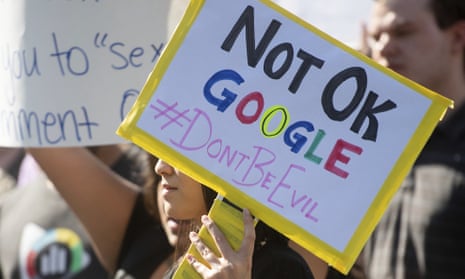Women at Google lose out on thousands of dollars each year compared with men as a result of discriminatory practices including pushing female employees into lower-paying career tracks, a lawsuit has alleged.
The findings stem from an ongoing lawsuit brought against Google in 2017, which accused the tech company of gender pay discrimination between female employees – from coders to teachers in its in-house childcare department – and their male counterparts. More details about the extent of the pay disparity emerged in a memorandum filed in court on Tuesday to classify that lawsuit as a class action, which, if approved, would mean it applies to 10,800 women who have been employed by Google at any time since September 2013.
The women affected encompass a large variety of positions, and more than half are software engineers.
Women at Google make an average of $2,000 less per year than men on paper, but may be losing out on even more, David Neumark, a University of California Irvine distinguished professor of economics, found in a study cited in the lawsuit. His calculations showed women at Google may be losing out on $17,000 a year because of discriminatory job classifications.
“Google has a pattern and practice of channeling women with comparable education and experience into lower-salary levels,” James Finberg, a lawyer representing the plaintiffs in the case said.
The former employees bringing the lawsuit against Google have alleged the company tied starting salary to prior pay, perpetuating wage inequality. Google discontinued this practice in 2017, but has since failed to address the existing inequalities at the company, the lawsuit alleges.
Google’s job classification system divides employees into different responsibility levels to determine tasks and compensation. Under that system, workers in the same “job family” at Google are “those that are doing similar job duties and responsibilities but stratified at different levels of capabilities or skill sets”. Different levels within each job family come with different salary grades. The lawsuit alleges women were consistently pushed into lower-level job tracks and paid less than men with similar job descriptions.
Kelly Ellis, a plaintiff in the case, claimed she experienced this when she was first hired at Google. She felt she had enough experience to be placed at a higher responsibility level and didn’t initially understand how the classification system worked at the company. She soon came to understand that male colleagues with similar education had been assigned more responsibilities and higher pay from the beginning.
“Throughout my time at Google, I always felt like I was behind where I should have been and trying to catch up,” she said.
Ultimately Google paid women less base salary, smaller bonuses, and less stock than men in equal job codes and locations, the lawsuit alleges. The likelihood of such a disparity occurring by chance rather than by direct discrimination is 1 in 100, Neumark’s analysis showed.
Heidi Lamar, another plaintiff in the case claims she experienced the same patterns in her position in the Google childcare facilities. She said Google management blamed it on her work quality or the performance in her initial job interview, but investigations as part of the lawsuit found this wasn’t the case. In this discovery process, during which the legal team searched for evidence of discrimination, an evaluation of her interview showed she received high marks.
“I felt very vindicated when I saw my interview scores were higher than my male colleagues,” she said. “I suspected as much, but it was nice to have it proven.”
The discovery process revealed a number of systemic discriminations, including that 49% of people hired as Level 2 software engineers were women but that percentage dropped for higher level positions – 22% for Level 3, 14.2% for Level 4, and 7.2% for Level 5. Ellis said that when she was hired, she was asked what she was paid at her previous job and given the same salary at Google.
“I didn’t really realize the full extent to which I was discriminated against until I stopped working there, and I realized even more being involved in this lawsuit just how blatant and what a pattern it all was,” Ellis said.
To address pay equality, Google has been running yearly pay equity analyses since 2012, said Eileen Naughton, vice-president of People Operations at the company. As a result of these investigations the company made salary adjustments for 2% of employees in 2019, totaling $5.1m.
“The claims in this lawsuit are unfounded and we plan to defend our policies and practices,” Naughton said.
There will be a hearing for the case on 2 December.










